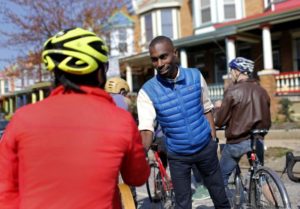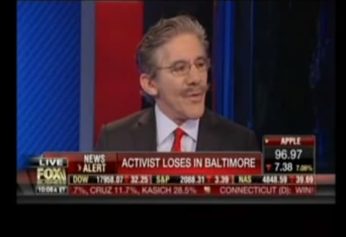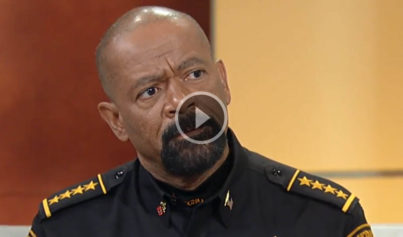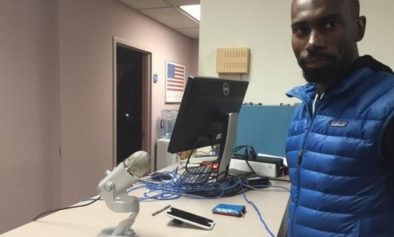
Black Lives Matter activist DeRay McKesson talks with cyclists in the Charles Village neighborhood of Baltimore. Photo courtesy of Patrick Semansky/AP.
Democratic nominee Catherine Pugh emerged victorious in Baltimore’s mayoral primary on April 27. The former state senator was in a tight race with former Baltimore Mayor Sheila Dixon, winning the primary with 37 percent of the vote while Dixon picked up 34 percent, The Root reports.
This time around, the mayoral race was teeming with candidates, many of whom received terribly small percentages of voter support. Popular Twitter activist and likely candidate for change DeRay Mckesson was one of those candidates. Mckesson landed in 6th place with just 2 percent of the vote. His defeat left many wondering how the Black Lives Matter activist’s social media popularity didn’t translate to votes in the race for mayor.
Mckesson was deemed a serious contender to those familiar with his work outside the city of Baltimore. The activist boasts over 300,000 followers on Twitter, but Baltimore’s residents obviously aren’t impressed by his prowess or popularity on social media. Per The Root, Baltimore activists consider Mckesson a “social media activist” because they don’t see him on the ground building relationships with citizens like the other local activists. Baltimore residents just didn’t know much about him. Only a few of his campaign posters could be seen around the community, according to The Root.
An article by The Washington Post however, reports that Mckesson and two of his volunteers were going door-to-door Wednesday night handing out pamphlets on Culver Street, a Black neighborhood on the West Side. He introduced himself to three older voters and ran through his list of superlatives: he’s recognized as one of Fortune Magazine‘s greatest leaders and has met President Obama and presidential hopeful Hillary Clinton.
Retired state worker Vivian Jackson, 68, seemed unconvinced yet impressed by 30-year-old Mckesson’s accomplishments. As he moved on to the next house, she told the paper she had never heard of the activist before; she doesn’t have internet service.
“We didn’t really know him,” Ray Kelly, a community organizer for the No Boundaries Coalition, a front-line advocacy group in West Baltimore told The Washington Post. “Mayor of Baltimore is not a starter job.”
One-time foe Shaun King thinks McKesson tried to become mayor of Baltimore too soon. In an article, King acknowledges that the activist is “wicked smart, casts a great image, is ambitious, and is clearly not afraid of the camera,” but doesn’t have enough experience yet.
King, a New York Daily News reporter, goes on to reference many civil rights activists-turned-politicians like Julian Bond, John Lewis and Andrew Young, who worked their way into political offices.
“Before John Lewis ever became a congressman in Atlanta, he worked for Jimmy Carter in the White House then ran successfully for Atlanta’s City Council,” he wrote. “Again, this wasn’t an exercise in patience, it was about getting to know people and understanding how the system worked.”
King revealed that Mckesson hadn’t even been living in Baltimore and described his shot for the highest office in the city as “a political miscalculation.”


